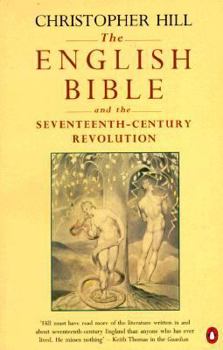The English Bible and the Seventeenth-Century Revolution
Select Format
Select Condition 
Book Overview
The translation of the Bible into English in the 16th century was one of the most important events in English history. Previously, the sacred text had been accessible only to a tiny minority, now anybody could read or listen to it.
Format:Paperback
Language:English
ISBN:0140159908
ISBN13:9780140159905
Release Date:January 1995
Publisher:Penguin Group
Length:480 Pages
Weight:0.65 lbs.
Dimensions:0.8" x 5.0" x 7.7"
Customer Reviews
2 ratings
ON BEING GOD'S ENGLISHMEN
Published by Thriftbooks.com User , 17 years ago
Although both the parliamentary and royalist sides (as well as factions within each side) in the English Revolution, the major revolutionary event of the 17th century, quoted the Bible, particularly the newer English versions, for every purpose from an account of the fall to the virtues of primitive communism that revolution cannot be properly understood except as a secular revolution. The first truly secular revolution of modern times. So why would the pre-eminent historian of the English Revolution, the late Christopher Hill, write a whole book about the influence of the Bible in that revolutionary period? As been noted by more than one commentator there is sometimes a disconnect between the ideas in the air and the way those ideas get fought out in political struggle. In this case secular ideas, or what passed for such to us, such as the questions of the divinity of the monarch, of social, political and economic redistribution and the nature of the new society (the second coming) were expressed in familiar religious terms. That being the case there is no better guide to understanding the significance of the mass of biblical literary articles produced in the period than Mr. Hill. The only objection one can have is that he overloads his argument for the importance of the Bible in the social discourse of the times with more examples than necessary and with a certain redundancy and overlap in the subjects he looks at such as the importance of the garden (of Eden), the wilderness and the hedge in Biblical narrative, the concept of England as a chosen nation and the English as a chosen people and of the decisive weight of the Old Testament as a source of inspiration (and vengeance). However, this is only a minor objection. In this expansive book Mr. Hill connects the wide spread use of the Bible with the revolution in printing bringing its message to the masses; the effects of the Protestant Reformation on individual responsibility for bible study and leading a moral life; various interpretations of Adam's fall, the consequences of that fall and the possibilities for redemption; the theology of the divine right of kings and the concept of the man of blood exemplified by Charles I; the role of the priesthood of all believers that foreshadow a very modern concept of the validity of individual religious expression; radical interpretations of equality and primitive communism, particularly the work of Gerrard Winstanley ; the Puritan ethic and many more subjects of interests. Here Hill also uses his usual cast of characters that one has met in other works including, Oliver Cromwell, Edmund Sexby, Hugh Peters, John Bunyan, the above-mentioned Gerrard Winstanley, Abizer Coppe, the Levelers, the Ranters, the Quakers and the Fifth Monarchists. And seemingly threading through the whole narrative, John Milton. Read on.
A scholarly book on an interesting subject
Published by Thriftbooks.com User , 23 years ago
Hill does a magnificent job examining the impact of vernacular bibles and increased literacy in 17th century England and how reading is fundamental to change, for better or for worse. Although his footnotes are precise and painstakingly formulated, they tend to interfere with the text's fluidity. The frequent quotes are entertaining; however, Hill would have done better to finish his thoughts in his own words. The interruptions make the reading choppy. There is a wealth of information here, though, and I consider this book both a handy reference for Renaissance study and an insightful roadmap to research of pre-modern English theology. The only obstacle between this book and a fifth star is its cerebral approach, making the assumption that its readers are intimately familiar with the period, the environment and the theology of 17th Century England.






